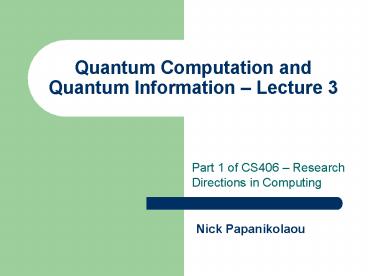Quantum Computation and Quantum Information Lecture 3 - PowerPoint PPT Presentation
1 / 40
Title:
Quantum Computation and Quantum Information Lecture 3
Description:
Quantum computers are built from wires and logic gates, just as classical computers are ... No loops are allowed; quantum circuits are acyclic. Fan-in is not allowed: ... – PowerPoint PPT presentation
Number of Views:104
Avg rating:3.0/5.0
Title: Quantum Computation and Quantum Information Lecture 3
1
Quantum Computation and Quantum Information
Lecture 3
- Part 1 of CS406 Research Directions in Computing
Nick Papanikolaou
2
Motivation
- Quantum computers are built from wires and logic
gates, just as classical computers are - The potential of such devices stems from the
ability to manipulate superpositions of states - Quantum algorithms solve problems which are not
known to be solvable classically!
3
Lecture 3 Topics
- Quantum logic gates
- Simple quantum circuits
- Quantum teleportation as a circuit
- Deutschs quantum algorithm
4
Quantum vs. classical gates
- The simplest boolean gate is NOT, with truth
table - Quantum gates have to be defined not only on the
equivalents of 0 and 1, but on their
superpositions too!
5
Quantum NOT gate Linearity
- Suppose we define a quantum NOT gate as follows
- The action of the quantum NOT gate on a
superposition must then be - All quantum operations are linear
6
The NOT Gate as a Matrix
- Because all quantum operations have to be linear,
we can represent the action of a quantum gate by
a matrix - The quantum NOT, or Pauli-X gate, is written
7
Quantum State Vectors
- Remember that a quantum state is represented by a
vector - Notation
8
Quantum NOT
- We can express the NOT operation on a general
qubit as matrix multiplication
9
Other Single Qubit Gates
- The Pauli-X gate works on only one qubit
- Other common single qubit gates are
- Pauli-Z gate
- Pauli-Y gate
- Hadamard gate
10
Summary of Simple Gates
11
Reversibility Requirement
- All quantum operations have to be reversible
- Boolean operations are not necessarily so
- A reversible operation is always given by a
unitary matrix, i.e. one for which
12
The Controlled NOT Gate
- The CNOT gate is the standard two-qubit quantum
gate - It is defined like this
13
The Controlled NOT Gate (2)
- CNOT is a generalisation of the classical XOR
- The CNOT gate is drawn like this
control qubit
target qubit
14
The Controlled NOT Gate (3)
- The matrix corresponding to the CNOT gate is
- The CNOT together with the single qubit gates are
universal for quantum computing
15
Quantum Circuits
- Using the conventions for control and target
qubits, we can build interesting circuits - Example A Qubit Swap Circuit
16
Qubit Swap Circuit
17
Features of Quantum Circuits
- No loops are allowed quantum circuits are
acyclic - Fan-in is not allowed
- Fan-out is not allowed
18
Generalised Control Gate
- Any quantum gate U can be converted into a
controlled gate
One control qubit
n target qubits
U
If the control qubit is high, U is applied to
the targets. CNOT is the Controlled-X gate!
19
Quantum Measurement
- Measurement in a quantum circuit is drawn as
M
(classical bit representing outcome of
measurement)
M 0 with prob. or M 1 with prob.
If
then
20
A Qubit Cloning Circuit?
- Using the XOR gate, it is possible to copy a
classical bit
Can we build a quantum circuit that performs does
this with qubits?
21
A Qubit Cloning Circuit? (2)
OK here
entangled!!
22
A Qubit Cloning Circuit? (3)
It is impossible to clone a qubit! Also note that
unwanted terms!
23
The Bell State Circuit
x
y
24
The Bell State Circuit By Example
?
25
Quantum Teleportation Circuit
M1
H
M2
XM2
ZM1
26
Quantum Teleportation Circuit (2)
M1
H
M2
XM2
ZM1
27
Quantum Teleportation Circuit (3)
M1
H
M2
XM2
ZM1
28
Quantum Teleportation Circuit (4)
M1
H
M2
XM2
ZM1
00, 01, 10 or 11
29
Quantum Teleportation Circuit (5)
30
What have we achieved?
- The teleportation process makes it possible to
reproduce a qubit in a different location - But the original qubit is destroyed!
- Next topic Quantum Parallelism and Deutschs
quantum algorithm
31
Quantum Parallelism
- Quantum parallelism is that feature of quantum
computers which makes it possible to evaluate a
function f(x) on many different values of x
simultaneously - We will look at an example of quantum parallelism
now how to compute f(0) and f(1) for some
function f all in one go!
32
Quantum Circuits for Boolean Functions
- It is known that, for any boolean function
- it is possible to construct a quantum circuit Uf
that computes it - Specifically, to each binary function f
corresponds a quantum circuit
binary addition
33
Quantum Circuits for Boolean Functions (2)
- What can this circuit Uf do? Example
34
Quantum Circuits for Boolean Functions (3)
- But what if the input is a superposition?
35
Quantum Parallelism Summary
- So, a superposition of inputs will give a
superposition of outputs! - We can perform many computations simultaneously
- This is what makes famous quantum algorithms,
such as Shors algorithm for factoring, or
Grovers algorithm for searching - Simple q. algorithm Deutschs algorithm
36
Deutschs Algorithm
- David Deutsch famous British physicist
- Deutschs algorithm allows us to compute, in only
one step, the value of - To do this classically, you would have to
- compute f(0)
- compute f(1)
- add the two results
- Remember
37
Circuit for Deutschs Algorithm
38
Circuit for Deutschs Algorithm (2)
39
Circuit for Deutschs Algorithm (3)
40
End of Lecture 3
- Congratulations! If you are still awake, you have
learned something about - quantum gates (X, Y, Z, H, CNOT)
- quantum circuits (swapping, no-cloning problem)
- teleportation
- quantum parallelism
- and Deutschs algorithm































